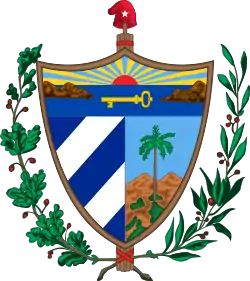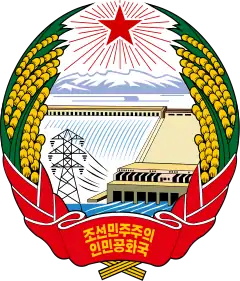Cuba–North Korea relations
Cuba–North Korea relations (Korean: 꾸바-조선민주주의인민공화국 관계, Spanish: Relaciones cubanas-coreanas del norte) are the bilateral relations between Cuba and North Korea.
 | |
Cuba |
North Korea |
|---|---|
Cuba has had diplomatic relations with North Korea since 29 August 1960.[1] Cuba maintains an embassy in Pyongyang and North Korea maintains an embassy in Havana.[2]
History
Cuba has been one of North Korea's most consistent allies.[3] North Korean media portrays Cubans as comrades in the common cause of socialism.[4] During the Cold War, North Korea and Cuba forged a bond of solidarity based on their militant positions opposing American power.[5]
Che Guevara, then a Cuban government minister, visited North Korea in 1960 and proclaimed it a model for Cuba to follow.[2] In 1968, Raúl Castro stated their views were "completely identical on everything".[5] Cuban leader Fidel Castro visited in 1986.[6] Cuba was one of the few countries that showed solidarity with North Korea by boycotting the Seoul Olympics in 1988.[5]
Fidel Castro wrote that in the 1980s Kim Il-sung, "a veteran and irreproachable combatant, sent us 100,000 AK-47 rifles and its corresponding ammo without charging a cent".[7]
In 2013, a North Korean ship, the Chong Chon Gang, was searched while traveling through the Panama Canal and found to be carrying weapons from Cuba, apparently to be repaired in North Korea and returned.[8] The ship was later handed back to the North Korean government.[9][10]
In January 2016, North Korea and Cuba established a barter trade system. Also in 2016, the Workers' Party of Korea and the Communist Party of Cuba met to discuss strengthening ties.[3] After Fidel Castro's death in 2016, the North Korean government declared a three-day mourning period and sent an official delegation to his funeral.[6] North Korean leader Kim Jong-un visited the Cuban embassy in Pyongyang to pay his respects.[11]
In 2018, the new Cuban President Miguel Diaz-Canel visited North Korea, stressing socialist solidarity and opposition to sanctions.[12][13]
References
- Wertz, Daniel; Oh, JJ; Kim, Insung (August 2016). Issue Brief: DPRK Diplomatic Relations (PDF). The National Committee on North Korea. p. 8. Archived (PDF) from the original on 28 December 2016. Retrieved 19 January 2017.
- Cumings, Bruce (1997). Korea's Place in the Sun: A Modern History. New York: W Norton & Company. p. 394.
- Ramani, Samuel (7 June 2016). "The North Korea-Cuba Connection". The Diplomat.
- "DPRK-Cuba relations showcase mutual support and solidarity". Pyongyang Times. 27 August 2016.
- Young, Benjamin R (28 August 2016). "Revolutionary Solidarity: Castro's cozy relationship with North Korea". NK News.
- "N.K. declares 3-day mourning over ex-Cuban leader Castro's death". Yonhap. 28 November 2016.
- Iaconangelo, David (14 August 2013). "Fidel Castro Says North Korea Sent Cuba Free Weapons During Cold War". Latin Times. Retrieved 6 January 2018.
- Castillo, Mariano; Shoichet, Catherine E.; Oppmann, Patrick (17 July 2013). "Cuba: 'Obsolete' weapons on ship were going to North Korea for repair". CNN.
- Byrne, Leo (17 January 2014). "North Koreans ready to pay for arms smuggling ship and crew: North Korean Foreign Ministry agrees to pay $666,666 fine". NKNews.com. Retrieved 17 February 2014.
- Byrne, Leo (10 December 2015). "OFAC's new sanctions on N. Korean shipping". NK News. Retrieved 25 December 2015.
- "DPRK leader conveys condolences over passing of Fidel Castro". Xinhua. 29 November 2016.
- "Cuban President Meets North Korea's Kim Jong Un as Part of First Overseas Tour". Time. 4 November 2018.
- "Cuban president meets North Korea's Kim Jong Un in Pyongyang". AP NEWS. 5 November 2018. Retrieved 8 December 2020.
Further reading
| Wikimedia Commons has media related to Relations of Cuba and North Korea. |
- Castro, Fidel; Kim Il-sung (1986). Unbreakable brotherly friendship and solidarity between Korean and Cuban peoples: Comrade Fidel Castro Ruz on a visit to the Democratic People's Republic of Korea, March 8 to 11, 1986 [speeches by Fidel Castro and Kim Il-sung]. Pyongyang: Foreign Languages Publishing House. OCLC 877158604.

